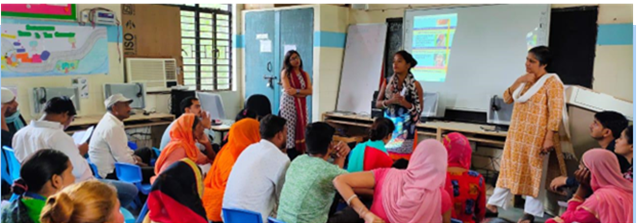Framework for Inclusion
Inclusion, in general, is an area that is often neglected in the Indian public education system. Various factors contribute to this neglect. According, to The Rights of Persons with Disabilities (RPWD) Act 2016, inclusion is defined as a ‘system of education wherein students with and without disabilities learn together and the system of teaching and learning is suitably adapted to meet the learning needs of different types of students with disabilities.’ Meeting these needs has been a challenge due to a range of barriers ranging from a lack of awareness to a lack of resources. Children with disabilities face difficulty in accessing and remaining in education due to attitudinal and behavioral barriers related to social norms; infrastructural and environmental barriers; and resource barriers.
Objectives of the Framework
To create a framework for inclusive education that is legally sound, cost-effective, and caters to a wide variety to disabilities. The objective of the inclusion framework is to set guidelines for students, parents, educators, and administrators for their orientation and training as well as engagement for creating effective inclusive spaces for all. The framework also aims to encourage the involvement of all the stakeholders including teachers, Principals, School level education officials and other staff members, SMC, parents, and peers.
- LENS Foundation hired a special educator to oversee the Special Education Needs (SEN) of the students at Peepul-SDMC Primary School, 144, Block A, Dayanand Colony, Lajpat Nagar IV, New Delhi 110024.
- The SEN educator familiarized herself with the working of the school and observed classes and discussions with teachers. She went through the Jolly Phonics program to understand the English teaching practices followed in the school.
- With the help of line managers and social workers, she organized parent meetings with the following agenda:
- To make the parents aware of the needs of their children.
- To ensure parents are aware of the Indian Disability Act and its features relevant to them.
To advise them to take children for relevant assessments so that they are able to obtain the disability certificates.
- The meeting was attended by 45 parents and was facilitated by the Special Educator, Academic Coordinators, Social Worker, Education Director and the Principal of the school.
One of the parents spoke eloquently about accepting her child as ‘different’ but not giving up on her mission to give her child all the support possible within her limited means. One of the parents spoke eloquently about accepting her child as ‘different’ but not giving up on her mission to give her child all the support possible within her limited means.
Project Implementation
The newly formulated timetable was put into execution and after 3 weeks, a review was done to understand its effectiveness and short-comings. Some of the problems.
Identified were –
- Pairing of certain children didn’t work and was then modified accordingly.
- It was felt that certain children had a greater need for support than what was previously thought and so modifications were done.
Based on their educational and personal needs the children were divided into three kinds of support system:
- Real-time classroom support
- Pull out – Individual session
- Pull out – Group/Pair sessions

After consultation with teachers short-term and long-term goals were set for each child. Individual Learning Plans were created for these children.
After the successful implementation of the SEN programme for one year in the model school, extensive authentic data was collected and we came to the following conclusions:
- Processes and templates required to implement a cost-effective school-based programme, using existing resources of government schools need to be prepared.
- Awareness building, sensitisation, and training for all stakeholders in school education: school managers, teachers, parents and education officials is crucial. Partnerships need to be fostered between civil society and the government for the benefit of special needs children.
These conclusions and data received during implementation of the SEN programme led us to design an Inclusion Framework that was backed with data. The framework included plans for interventions and implementation to successfully run an SEN programme in government schools.
The framework also included the infrastructure requirements to cater to children with special needs. The general and administrative SOPs that lay out the primary connection between organizational leadership, policymakers, planners, administration personnel, and school’s teachers were also developed. Reporting structure and schedule were prepared for the special educator and class teacher.
The framework was then finalised with the above-mentioned processes and other necessary templates and has been put in the form of a document which can be used to guide any body to implement a SEN Programme in a school.
The next steps for LENS Foundation are to disseminate and implement this framework through the right partnership model. The ideal partners are state governments and municipal corporations which operate schools.
LENS Foundation shall work towards the dissemination of this framework through advocacy and efforts to partner with school operating agencies in the coming years.


